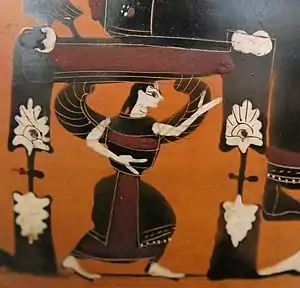Metis (mythology)
Metis (/ˈmiːtɪs/; Ancient Greek: Μῆτις, romanized: Mêtis, lit. 'wisdom', 'skill', or 'craft'), in ancient Greek religion, was a mythical Titaness belonging to the second generation of Titans.

| Greek deities series |
|---|
| Titans |
| Personified concepts |
By the era of Greek philosophy in the 5th century BC, Metis had become the mother of wisdom and deep thought, but her name originally connoted "magical cunning" and was as easily equated with the trickster powers of Prometheus as with the "royal metis" of Zeus.[1] The Stoic commentators allegorised Metis as the embodiment of "prudence", "wisdom" or "wise counsel", in which form she was inherited by the Renaissance.[2]
The Greek word metis meant a quality that combined wisdom and cunning. This quality was considered to be highly admirable, the hero Odysseus being the embodiment of it. In the Classical era, metis was regarded by Athenians as one of the notable characteristics of the Athenian character.
Family
Metis was an Oceanid, the daughters of Oceanus and his sister Tethys, who were three thousand in number. She was a sister of the Potamoi (river-gods), sons of Oceanus and Tethys, who also numbered three thousand. Metis was the first great spouse of Zeus,[3] and also his cousin.[1] Zeus is himself titled Metieta (Ancient Greek: Μητίετα, lit. 'the wise counsellor'), in the Homeric poems.
Mythology
Metis was the one who gave Zeus a potion to cause Cronus to vomit out Zeus' siblings.[4]
Metis was both a threat to Zeus and an indispensable aid:[5]
Zeus lay with Metis but immediately feared the consequences. It had been prophesied that Metis would bear extremely powerful children: the first, Athena and the second, a son more powerful than Zeus himself, who would eventually overthrow Zeus.[6]
In order to forestall these dire consequences, Zeus tricked her into turning herself into a fly and promptly swallowed her.[7] He was too late: Metis had already conceived a child. In time she began making a helmet and robe for her fetal daughter. The hammering as she made the helmet caused Zeus great pain, and Hephaestus either clove Zeus's head with an axe,[8] or hit it with a hammer at the river Triton, giving rise to Athena's birth. Athena leaped from Zeus's head, fully grown, armed, and armoured. Zeus was none the worse for this experience.
The similarities between Zeus swallowing Metis and Cronus swallowing his children have been noted by several scholars. This also caused some controversy in regard to reproduction myths.[9][10]
Hesiod's account is followed by Acusilaus and the Orphic tradition, which enthroned Metis side by side with Eros as primal cosmogenic forces. Plato makes Poros, or "creative ingenuity", the child of Metis.[11]
In sociology
In his 1998 book Seeing Like a State, James C. Scott used “metis” to describe the knowhow, experience and wisdom that people acquire in building expertise, as a key contributor to success in society that is not accounted for by the high modernist approach to central administration.
Honours
- Metis Island in Antarctica is named after the deity.
- 9 Metis, one of the larger main-belt asteroids, is named after the deity.
References
- Norman O. Brown, "The Birth of Athena" Transactions and Proceedings of the American Philological Association 83 (1952), pp. 130–143.
- A.B. Cook, Zeus (1914) 1940, noted in Brown 1952:133 note.
- M. Detienne and J.-P. Vernant, Les Ruses de l'intelligence: la Mètis des Grecs (Paris, 1974). ISBN 2-08-081036-7.
- Pseudo-Apollodorus, Bibliotheke (Apollod. 1.2.1; Hesiod. Theogony 471.
- Brown 1952:133
- Hesiod's Theogony, 886–900 Available at wikisource
- Lang, Andrew (1901). Myth, Ritual and Religion. 2. Longmans, Green. pp. 194, 262–263. OCLC 13809803. Retrieved 2018-04-10.
- Pindar, Seventh Olympian Ode the first written appearance of this iconic image, which A.B. Cook showed first appears in 6th-century BC vase-painting; previously the Eilithyiaa attend Zeus at the birthing.
- King, Helen. "Reproduction Myths". Encyclopedia.com. Retrieved 2020-07-12.
- King, Helen (2006) [2005]. "Metis". The Oxford Companion to World Mythology. Oxford University Press. Retrieved 2020-07-12.
- Symposium.
Further reading
| Wikimedia Commons has media related to Metis (mythology). |